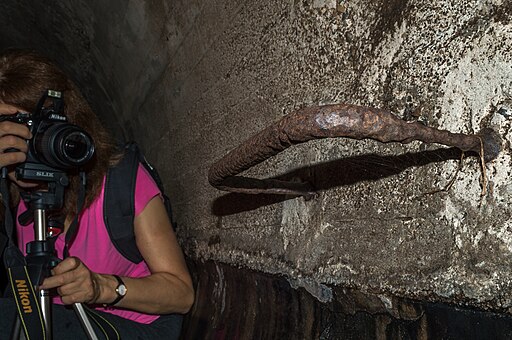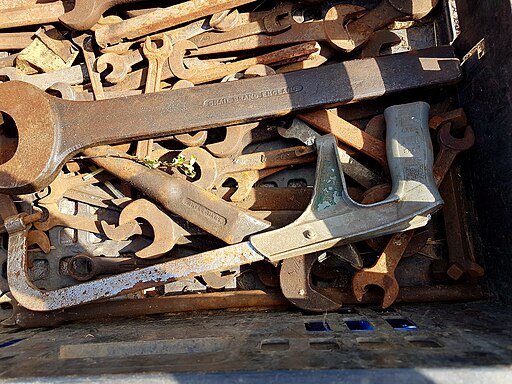The UK is a fairly humid, wet country, and we have many jewellers and other craftsmen and craftswomen who work in sheds or home workshops.
A question was asked in the Society of British Jewellers facebook group recently by a lady whose tools have gone rusty due to a leaking pipe. I’ve had similar things happen in my shed just due to general damp. However, it’s also a fairly useful ‘skill’, as you can easily find old vices, hammers, and other used tools at car boot sales, rusted up but with a little work, perfectly servicable.
Refurbishing old tools is actually a hobby of mine, and seems to be becoming more popular with youtube channels like HandToolRescue and TysyTube.
So, the longer you leave rust on tools, the deeper in it will ‘eat’. For tools from car boots and garage sales, this isn’t usually a massive issue; you’d have had a look at them and decided on the spot whether they were too far gone or not.
It’s rather difficult for rust to destroy certain tools. Hammers and vices are thick and solid enough that surface rust will cause little damage, and vices especially have few ‘precision’ components, providing the screw is intact.
However, obviously, for some jewellery making tools and other fine engineering etc the tolerance for sizing on parts can be very important. The key one that springs to mind for me is rolling mills, where the rollers will produce inconsistent results if even a few millimetres inaccurate.
Rust removal is easy enough, but it is critical – CRITICAL that once the rust is removed, you immediately coat the tools with something that will stop the formation of extra rust – cosmolene, cold bluing, grease, gun oil, mineral oil, etc.. they will ‘flash rust’ and I’ve seen this happen on an old bayonet in literally minutes.
There’s a lot of schools of thought on rust removal and I’ve tried a few dozen and ultimately I think my favourite is a product called Evaporust..
Evaporust is rather pricey, but you can just submerge rusty items into it and go back a day later.
It does leave darker coloured patches on the surface of the steel due to migration of carbon, but more or less all chemical approaches will too. Evaporust claims to be largely non toxic, which I do consider a bonus, but still treat it as if it is and wash your hands etc.
When dealing with handled tools, I tend to make a support or dangle them on strings, so that only the metal is dipping into the solution; if that isn’t possible, say, hammers, I go for another approach and just wire brush the rust off before repolishing and treating with oil.
On a budget, a wire brush on an angle grinder will tear through a lot of rust for £5 worth of ‘brush’, but they’re horrible on your hands and arms, loud, and little bits of wire do tend to fire off into your face/apron. They also do not leave a good surface finish. Also, you do not really want to breathe in airborne rust.
In the field for a short term fix, the best I’ve come up with is a mix of either ketchup or brown sauce, and salt – the salt acts as a mild abrasive and the vinegar and other acids in the sauce shifts some of the gunk.
It is likely if you have had a leak, or work in a very humid area, that wooden handles on tools will show mould or spores.
Mould is not actually as much of an issue as you’d think unless the handles feel ‘squishy’. If they don’t, personally I’d just use a wet cloth to wipe any wood clean, then dip them in (or rub with a cloth) a wood treatment, say, teak oil, yacht varnish, OR my personal preference is a mixture of beeswax and mineral oil – you can buy this but it is cheaper to make your own.
Bear in mind cloths with teak oil etc on can self combust -days- later so always burn any rags you have used to treat wood with VOC chemicals. Ventilation is important too as breathing them in is not good for you.
Tools and supplies
Price accurate in the UK as of time of writing – 31/10/2023. Spooky.
- Evaporust rust remover – currently £19.99 on Amazon, but can sometimes be found for as little as £15 in Toolstation. A 5L container is available for £35.75, which is what I would go for personally.
- Wire brush set for drill or angle grinder – anywhere from £5 to £10, but remember to budget extra for a leather apron and a protective rated facemask.
- Ventilation and patience – priceless.
- Multi purpose grease to protect the metal after cleaning off the rust. – I have used this one, but you can find cheaper in stores, without delivery. Lithium grease, multi purpose grease, gun oil, white grease, etc. In a pinch, animal fats or vegetable oils could be used for a short term solution but they will degrade fast.
- A treatment for wooden tool handles – teak oil, butchers block oil, yacht varnish, or in cases of suspected woodworm, replace the handles entirely.





Great advice, I have used a grinder in the past but you have to be careful not to dig into the metal and cause a gouge, wire brushed are great for surface rust and work a treat on jewellery files.